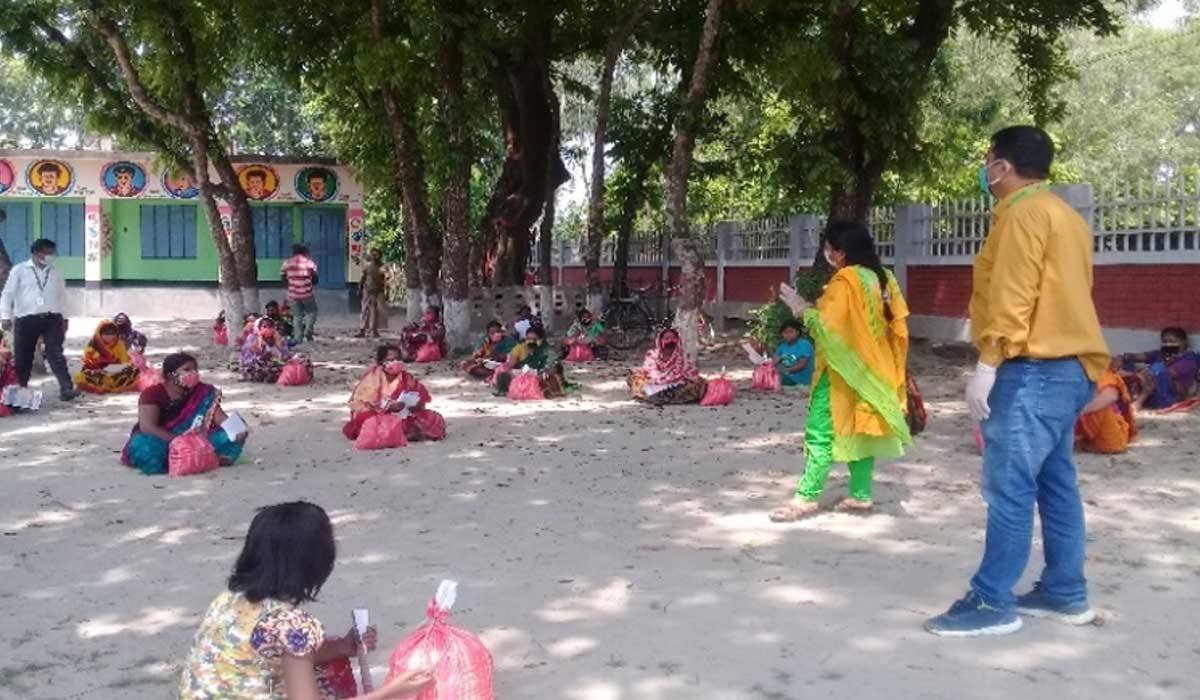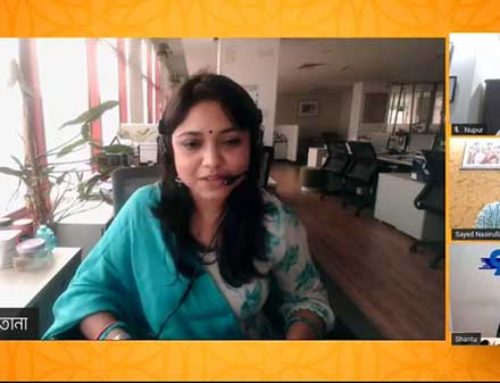 Food Assistance for Adibashi Community in Thakurgaon, Sadar Upazilla
Food Assistance for Adibashi Community in Thakurgaon, Sadar Upazilla
Introduction of the organization
HEKS/EPER is an international organization which mainly supports the social and economic integration of marginalized minorities. During the liberation war of Bangladesh HEKS/EPER directly provided emergency support to 10 million Bengali refugees who took shelter in different parts of India. After the independence of Bangladesh, HEKS/EPER started development work to rebuild the war-ravaged nation trough health, education, income development through partnership with like-minded national level NGOs. The programme focuses on social inclusion of most marginalized people, Dalits (job and caste-based discriminated groups), Indigenous people (commonly known as Adibashi) living in rural and urban zones of the plain land areas in Northwest Bangladesh.
Programmatic interventions in response to COVID-19
Since the COVID-19 pandemic occurred in Bangladesh, HEKS/EPER is keeping cautious eyes on the situation. This intervention includes options for diverse members of the targeted plainland indigenous/Adibashi, Dalit and bottom poor people from mainstream communities’ households including women and men, people with disability, elderly people, children and adolescents. HEKS/EPER has taken initiatives of several interventions in response to COVID-19 with its partner organization. The major interventions are following:
- Awareness raising activities: At the beginning of March 2020 HEKS/EPER started organizing door to door campaign through the partners in different locations under three different projects. The project staff oriented thee community people on “do & don’ts” to prevent the contamination of COVID-19. Awareness raising & sensitization sessions were conducted regarding COVID-19 among the targeted plainland indigenous/Adibashi, Dalit and bottom poor people from mainstream communities. In some locations there were joint awareness campaign with the Upazila administration. Besides, the partner organization has distributed banner, poster, leaflets, mike announcement focusing on social distancing and advised staying at home. Also, demonstration of hand-washing activities and other important hygiene issues for protection from COVID-19 were enacted for the targeted community people to follow.
- Essential Food support: HEKS/EPER and its partner organizations have served 31,865 households (considering 5 persons/HH on average) out of which 11,697 are Adibashi; 1,464 Dalit and 18,704 are poor people from mainstream communities. As an emergency response HEKS/EPER with its partner organizations have been providing emergency food support/’food baskets’ (rice- 5kg, mustard oil-0.5 liter, Lentils-0.5 kg, salt-0.5 kg, potato-2 kg) to the PooC of plainland Indigenous people/Adibashis, Dalit from the 17 Upazilas and 02 City Corporations (Dhaka) under 6 Districts.
Besides, HEKS/EPER has provided financial assistance to the Network of Non-Mainstreamed Marginalized Communities (NNMC) for food assistance among 1,139 households of northwest plainland Dalit and Adibashi communities through the Advocacy Platforms in respective areas for emergency response of COVID-19. The platforms have distributed this food assistance according to the instruction of local administration & maintaining rule of social distancing by WHO.
Hygiene promotion activities: HEKS/EPER and its partner organizations have also provided hand washing facilities- detergent, bathing soap, washing soap, hand sanitizers, liquid hand wash, bucket-mug, bleaching powder to the households of plainland Adibashis & Dalit to prevent spreading COVID-19.
HEKS/EPER and its partners organizations have been facing challenges to response COVID-19 emergency are: inadequate budget as per the need; limited resources; mobility; lack of coordination with government and non-gov organization; potential risk of spreading infection due to gathering/social distancing is not maintaining by the mass people
Future outlook and recommendations
Anticipated future challenges: Bangladesh Government has already initiated plans and measures to control the outbreak in the country, new challenges have surfaced including the lack of testing facilities for the populace. There are by now only 11 functioning testing facilities which is very inadequate to get a hold of the actual situation as the number of tests conducted on patients is alarmingly low. This indicates to the lack of preparedness for future challenges which will spread easily and alarmingly fast among the most vulnerable groups at a community level around the country. Considering this lack of awareness of the actual situation among the most marginalized and excluded community many challenges will arise due to their economic instability including losing their day to day jobs. These communities – including plainland adibashi,
Lack of PCR labs and testing facilities resulting in conducting a small number of tests posses a threat to the awareness of the actual situation thus controlling preparedness around the country will possibly result to a failure. This impacts the most marginalized people as they are still forced to their day to day jobs like garments or daily labor. In order to mitigate the spread of the infection without any concrete information of the infected, the respective communities need economical help as well as substantial help to prevent the contamination. Although the communities have been reached through campaign, they still need more support personally, socially and financially.
Future Recommendation:
Bangladesh government has taken various initiatives to response COVID-19 but still those are inadequate. There are many specific issues which should be addressed through different interventions on the part of government or development partners & private sector in following:
- Rightly reaching the government allocations and supports it is required strong monitoring on social audit and governance system.
- Bring people under mobile banking coverage to ensure smooth transactions without physical presence.
- Make the process easier for root level people to have mobile banking
- Special allocations in the budget for the marginalized communities to overcome the impacts of COVID-19
- Provision for social security services.





